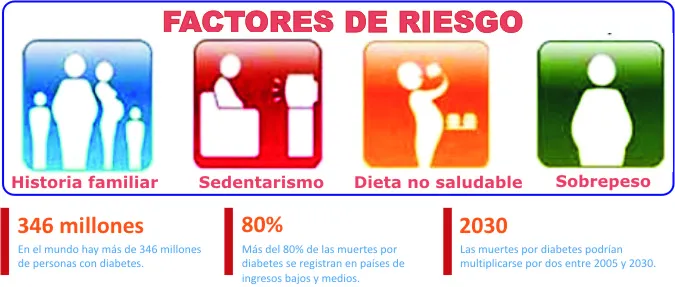17% of the Rioja population has a high or very high risk of developing type 2 diabetes in the next ten years, according to the conclusions of the "Findrisk" test, a diabetes screening method, carried out throughout Spain.
As reported by the authors of the study in a statement, this percentage is higher than the national average, where 15%of the population is high risk of developing diabetes, although Murcia (20.1%), Extremadura (20%) andCastilla-La Mancha (19%) communities with the greatest risk of diabetes.
On the opposite side, according to this study, Balearic Islands (8%) and Catalonia are (11%).
It has been observed, with this method, that in Spain 37% of the population has a slightly high risk of developing diabetes and 14% has a moderate risk.
The screening study, conducted by the Diabetes Foundation with the support of the Spanish Society of Primary Care Physicians within the "Diabetes can be prevented" campaign, whose objective is to determine the probability of developing type 2 diabetes among the population among the populationSpanish in the coming years and offer personalized recommendations.
Of the total population analyzed in La Rioja, 19% have obesity (body mass index-IMC greater than 30) and 30% are overweight (BMI between 25 and 30), that is, that one in two riojans (49%) has obesity or overweight.
Castilla-La Mancha has been the community in which there has been greater obesity (20.43% of respondents), followed by Andalusia (19.41%) and the Canary Islands (19%) compared to 16.27% on averagein the total participating population.
The autonomous cities of Ceuta and Melilla also presented a high percentage of obesity (21.67%).
According to the data collected, 59% of respondents in La Rioja have a family history of diabetes, specifically, 25% of the people who have conducted the survey have a direct relative with diabetes (parents, brothers or children) and 34% state to have other relatives (grandparents, uncles or cousins).
In relation to physical activity, more than 44% of the people who completed the test in La Rioja do not perform a minimum of 30 minutes of physical activity (or four hours a week) during work or free time.
For five years, the Diabetes Foundation has compiled through its website the data of 72,307 questionnaires, of which 460 correspond to La Rioja.


